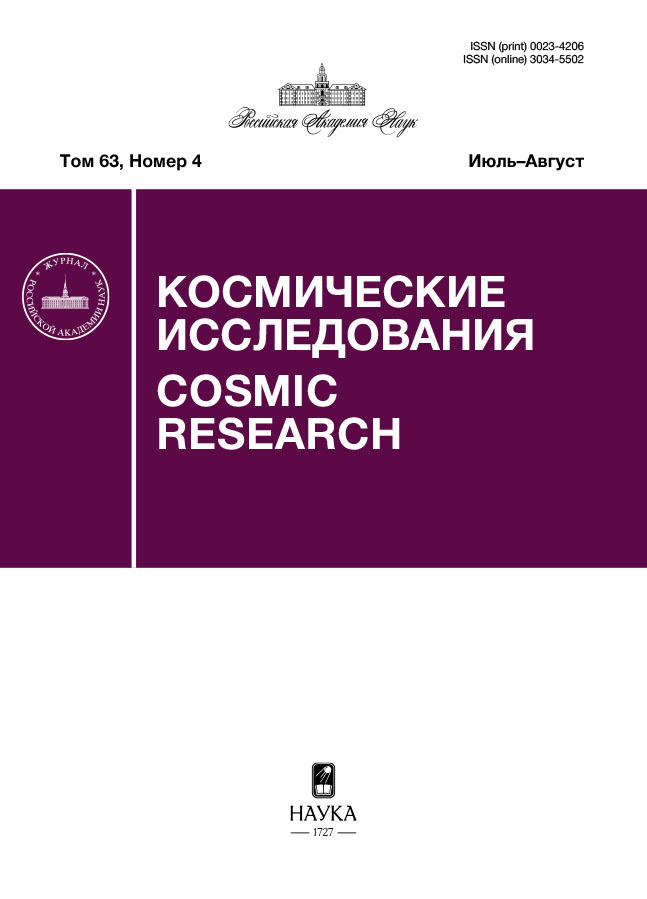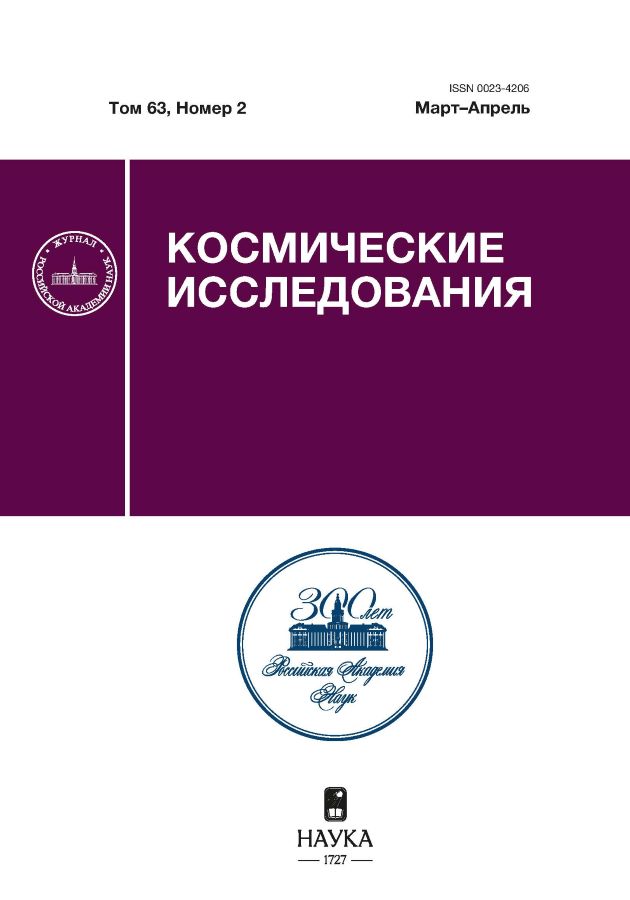Методики изменения гало-орбиты космического аппарата с целью сближения с астероидами
- Авторы: Пупков М.В.1,2, Эйсмонт Н.А.1, Старинова О.Л.2, Федяев К.С.1
-
Учреждения:
- Институт космических исследований РАН
- Самарский университет
- Выпуск: Том 63, № 2 (2025)
- Страницы: 179-189
- Раздел: Статьи
- URL: https://rjsocmed.com/0023-4206/article/view/683444
- DOI: https://doi.org/10.31857/S0023420625020055
- EDN: https://elibrary.ru/GNYLSJ
- ID: 683444
Цитировать
Полный текст
Аннотация
В работе представлены возможные варианты изменения орбиты космического аппарата, функционирующего вблизи солнечно-земной точки либрации, с целью пролета астероидов, сближающихся с Землей. Предложены два способа построения перелетных траекторий к одному или нескольким небесным телам: перевод аппарата с исходной ограниченной орбиты в окрестности точки либрации L2 системы Солнце – Земля на требуемую в этой же окрестности и его увод к Земле по траектории из множества неустойчивого многообразия. Приведены примеры, в которых в качестве целевых выбраны астероиды 1997 XF11 и Апофис, чьи траектории будут проходить вблизи космического аппарата в 2028 и 2029 гг. соответственно. Показано, что при имеющихся топливных ограничениях аппарат может быть перенаправлен к указанным астероидам предлагаемыми способами. Согласно проведенным расчетам, во всех случаях космический аппарат не покидает околоземное пространство и поэтому во время или после пролета исследуемого астероида может быть задействован в решении других научных задач.
Полный текст
Об авторах
М. В. Пупков
Институт космических исследований РАН; Самарский университет
Автор, ответственный за переписку.
Email: m.pupkov@iki.rssi.ru
Россия, Москва; Самара
Н. А. Эйсмонт
Институт космических исследований РАН
Email: m.pupkov@iki.rssi.ru
Россия, Москва
О. Л. Старинова
Самарский университет
Email: m.pupkov@iki.rssi.ru
Россия, Самара
К. С. Федяев
Институт космических исследований РАН
Email: m.pupkov@iki.rssi.ru
Россия, Москва
Список литературы
- Dunham D.W., Farquhar R.W., Loucks M. et al. The 2014 Earth return of the ISEE-3/ICE spacecraft // Acta Astronautica. 2015. V. 110. P. 29–42. https://doi.org/10.1016/j.actaastro.2015.01.002
- Racca G., Laureijs R., Stagnaro L. et al. The Euclid mission design // Space Telescopes and Instrumentation 2016: Optical, Infrared, and Millimeter Wave. V. 9904. P. 1–23. https://doi.org/10.1117/12.2230762
- Gardner J., Mather J., Abbott R. et al. The James Webb Space Telescope Mission // Publications of the Astronomical Society of the Pacific. 2023. V. 135. Iss. 1048. P. 1–29. https://doi.org/10.1088/1538–3873/acd1b5
- Эйсмонт Н.А., Коваленко И.Д., Назаров В.Н. и др. Управление орбитальным движением и ориентацией космической обсерватории Спектр-Рентген-Гамма // Письма в астрономический журнал. 2020. Т. 46. № 4. С. 292–303. https://doi.org/10.31857/S0320010820040051
- Михайлов Е.А., Аксенов С.А., Заславский Г.С. и др. Методика расчета параметров серии “больших” коррекций траектории полета КА “Спектр-РГ” для улучшения его радиовидимости // Письма в астрономический журнал. 2022. Т. 48. № 1. С. 61–74. https://doi.org/10.31857/S0320010822010065
- Назиров Р.Р., Эйсмонт Н.А., Арефьев В.А. и др. Задачи разработки миссии “Спектр-Рентген-Гамма” // Косм. исслед. 2019. Т. 57. № 1. С. 74–80. https://doi.org/10.1134/S0023420619010072
- Аксенов С.А., Бобер С.А. Компьютерное моделирование движения космического аппарата в окрестности точки либрации L2 системы Солнце – Земля. М.: Изд. ЦНИИмаш, 2015.
- Шувалов В.В., Светцов В.В., Артемьева Н.А. и др. Астероид Апофис – оценка опасных последствий ударов подобных тел // Астрономический вестник. 2017. Т. 51. № 1. С. 51–66. https://doi.org/10.7868/S0320930X17010042
- Yeomans D.K., Barriot J.-P., Dunham D.W. et al. Estimating the Mass of Asteroid 253 Mathilde from Tracking Data During the NEAR Flyby // Science. 1998. V. 278. Iss. 5346. P. 2106–2109. https://doi.org/10.1126/science.278.5346.2106
- Овчинников М.Ю. Введение в динамику космического полета. М.: Изд. МФТИ, 2016.
- Hechler M., Cobos J. Herschel, Planck and Gaia Orbit Design // Proc. Conf. Libration Point Orbits and Applications. 2003. P. 115–135. https://doi.org/10.1142/9789812704849_0006
Дополнительные файлы



















